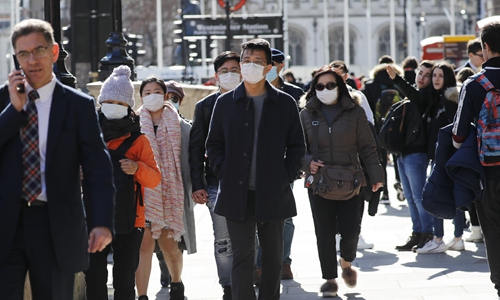HOME >> WORLD
UK increases risk efforts as COVID-19 death toll hits 55
By Sun Wei in London Source:Globaltimes.cn Published: 2020/3/17 8:44:41

People wear protective face masks as they walk down Whitehall in the Spring sunshine in central London. Photo:AFP
British Prime Minister Boris Johnson outlined his strategy to fight coronavirus (COVID-19) following a Cobra committee meeting on Monday.
Johnson told Britons to avoid pubs, clubs, restaurants, theaters, and only take necessary journeys in the fight against COVID-19. Those with a high temperature or persistent cough, or anyone in the same household with them, will need to stay home for 14 days.
It is the first of a series of daily news conferences at Downing Street, following criticism of No. 10 for lack of transparency over its plans to curb the virus.
Other efforts include daily news conferences hosted by the prime minister or senior ministers, alongside Professor Chris Whitty, the government's chief medical adviser, and chief scientific adviser Sir Patrick Vallance beginning Monday.
The latest round of disease prevention policies is in response to the so-called virus "herd immunity" plan first revealed by Johnson last Thursday.
The British government's strategy involves 60 percent of its population to contract the disease and then become immune to it.
The idea is different from what other countries have implemented, which have advised their citizens to live in social isolation.
The plan met harsh criticism when more than 295 academics living and working in the UK wrote an open letter published on Saturday, calling for immediate measures to restrict the spread of the virus.
The letter stated, "By putting in place social distancing measures now, the growth can be slowed down dramatically, and thousands of lives can be spared,"
Matt Hancock, the UK secretary of state for health and social care, stressed that achieving herd immunity for COVID-19 is not a stated policy.
"What we will do is listen to all the credible scientists, and we will look at all the evidence," Hancock said, and added "herd immunity is not our goal or policy, it's a scientific concept."
However, the side effects of the "shocking" strategy are obvious, many Britons have chosen to change their modes of living. Fewer people are using public transportation such as trains, tubes, and buses, and many locations that are normally crowded, such as train stations and cinemas, have been empty since Friday.
Ali Ahmed, an Uber driver in London, told the Global Times on Friday that there were fewer passengers during rush hour compared to normal weekdays.
"It is very quiet today," Ahmed said, adding that he was hoping for more trips because he thought people would tend to ditch the public transportation in favor of less populated vehicles.
George Zhang, executive director of Sino-European Finance Association, a non-profit in the UK, told the Global Times that many members of his organization have already started working from home.
"Following the government instructions and NHS, companies have business continuity plans, some of which were initiated and tested two weeks ago," Zhang said, adding that companies in London have a backup office at a different location separate from their headquarters, with multiple teams working at home or the office.
The new measures have been met with mixed response from the sports industry. The London Marathon, scheduled for April, has been moved to October.
However, over the weekend, thousands of runners participated in the Bath Half Marathon, and the recent Cheltenham Festival attracted tens of thousands of guests.
At supermarkets across London, panic buying of household items, including toilet paper, hand sanitizer, pasta, canned goods, and milk was reported.
Food retailer giants Tesco, Sainsbury's, and Asda, urged the public to stop buying more than what is needed, which has left many people without access to the same provisions.
According to the latest UK government figures, there are 1,543 confirmed COVID-19 cases, which includes 55 deaths.
Posted in: EUROPE